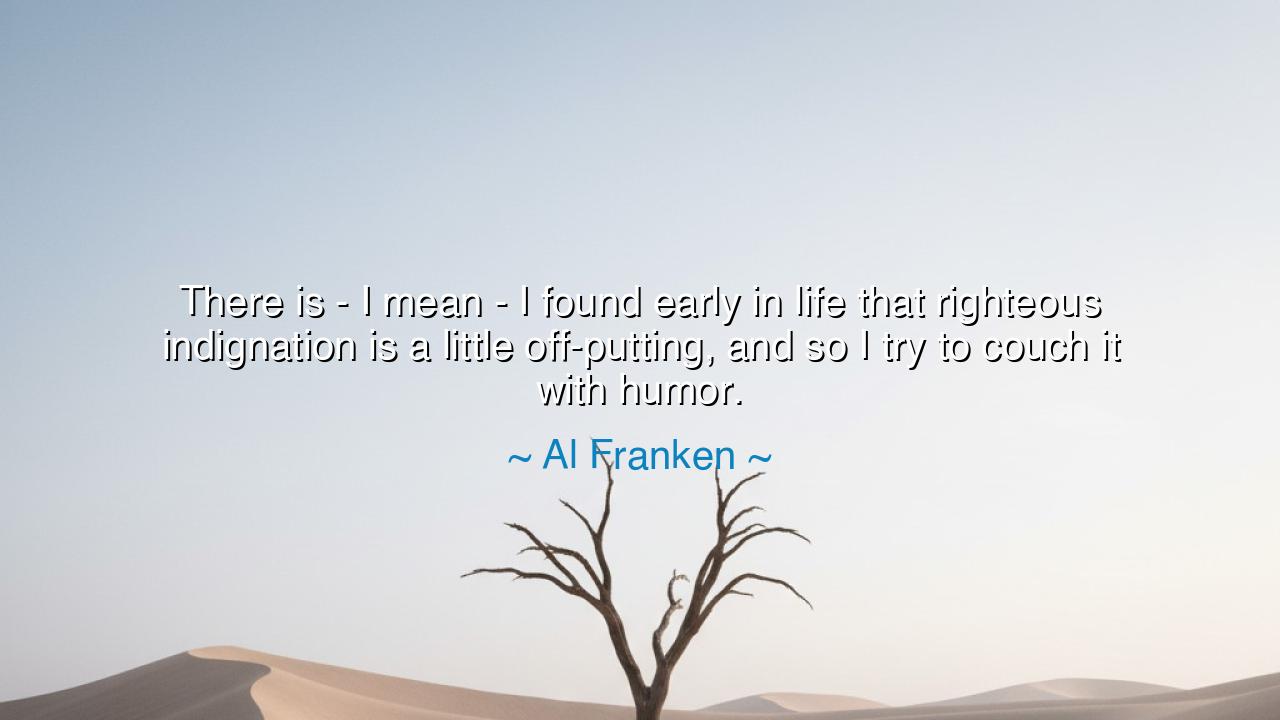
There is - I mean - I found early in life that righteous
There is - I mean - I found early in life that righteous indignation is a little off-putting, and so I try to couch it with humor.






The words of Al Franken carry the wisdom of one who has walked both the fiery paths of conviction and the winding roads of communication: “There is — I mean — I found early in life that righteous indignation is a little off-putting, and so I try to couch it with humor.” In these words, we hear the voice of a man who understands not only the power of belief but the art of delivery. He speaks of the tension between passion and humility, between the heat of conviction and the grace of laughter. His reflection reminds us that truth, though mighty, can only reach hearts when tempered by humanity.
Righteous indignation — that burning flame of moral outrage — has fueled revolutions, toppled tyrants, and exposed injustice. It is the fire of conscience, the sacred fury of those who refuse to accept cruelty or deceit. Yet, as Franken observes, that same fire can also repel those it seeks to warm. When indignation hardens into self-righteousness, it becomes pride wearing the mask of virtue. To wield moral passion without compassion is to brandish light so fiercely that it blinds. Thus, Franken discovered what the ancients knew: that the tongue of truth must be softened by the heart of laughter. For humor, when born of kindness, transforms confrontation into conversation.
The origin of this understanding lies deep within the art of persuasion — an art as old as civilization itself. Socrates, the great philosopher of Athens, often disarmed his students not with anger, but with irony. He would ask his questions with a smile, inviting reflection rather than resistance. By couching truth in humor, he allowed others to approach difficult ideas without fear or defensiveness. Franken’s insight flows from this same wisdom: that laughter opens the gates that anger might close. Humor is not weakness; it is strategy. It is the bridge between the righteous and the receptive.
In the realm of politics and public discourse, this lesson is even more vital. History is filled with voices who failed to move hearts because their indignation, though justified, became unbearable. Yet there are others who changed the world by coupling their seriousness with levity. Consider Abraham Lincoln, who, in the darkest days of the American Civil War, often used wit to ease tension and build connection. When accused of being two-faced, he famously replied, “If I were two-faced, would I be wearing this one?” His humor did not betray his resolve — it humanized it. Through laughter, he reminded others that even in righteousness, humility must remain.
Al Franken, who lived both as a satirist and a statesman, stands at the crossroads of those worlds. His realization — that untempered moral outrage alienates — came not from cynicism, but from compassion. To “couch” indignation in humor is not to dilute conviction, but to deliver it with empathy. In laughter, the message of justice finds ears willing to listen. In humor, the edge of anger becomes the melody of understanding. The wise warrior, whether in words or deeds, knows that to win a battle of hearts, one must fight not only with strength, but with grace.
The lesson, then, is timeless: let your convictions burn brightly, but never let them burn others. When you feel the rise of righteous indignation, pause and ask — will my anger illuminate or will it scorch? Speak your truth, but season it with kindness. Let humor be your lantern, softening the glare of your passion into a glow that others can stand beneath. The world does not lack the angry; it lacks those who can turn anger into understanding.
And so, dear listener, take this teaching to heart. When you confront injustice or folly, do not silence your outrage — refine it. Use humor as your ally, not to mock, but to connect. Laugh, not to dismiss pain, but to remind others — and yourself — that joy and truth are not enemies. As Al Franken discovered, the most persuasive soul is not the one who shouts the loudest, but the one who makes others smile even as they begin to see differently. For in laughter lies openness, and in openness lies the seed of change.
Thus remember: righteousness without compassion is tyranny, but humor without purpose is folly. To balance the two is the art of the wise — to speak with conviction, yet always with warmth. Let your fire burn, but let your laughter breathe. In that balance, you will not only speak truth — you will move the hearts of those who most need to hear it.






AAdministratorAdministrator
Welcome, honored guests. Please leave a comment, we will respond soon